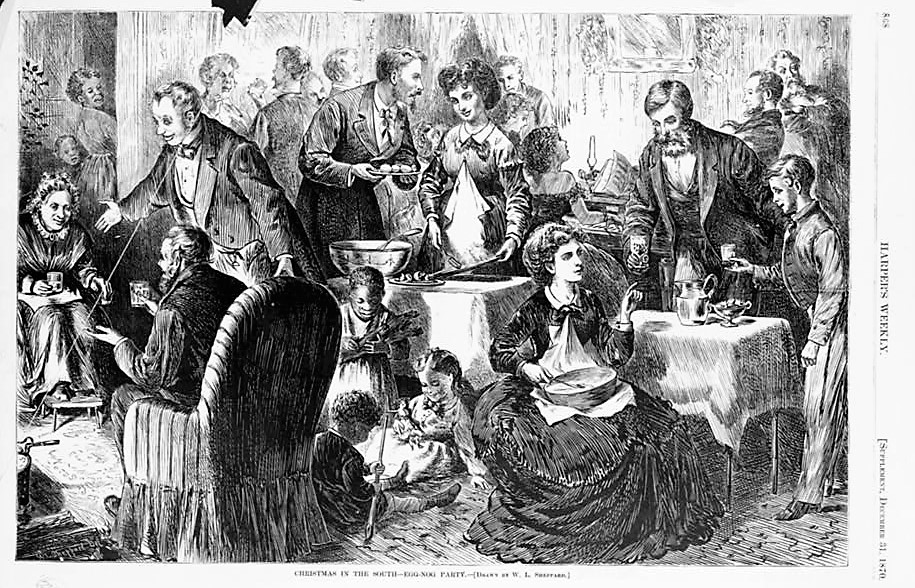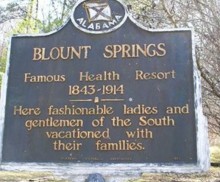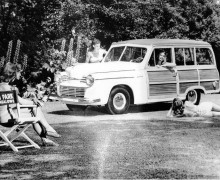(Excerpt from HISTORY OF ROANOKE1 The Roanoke Leader, Roanoke, Alabama November 1956 – 1957, presented as a Public Service, THE COMMERCIAL BANK)
Old-timers tell us, in their memory, from what they had heard, that Christmas here (Roanoke, Alabama), has always been largely a secular day, that people celebrated it as if it were their own birthday. But they add, “It took so little to make people happy then.”
Please don’t forget Alabama Pioneers this Christmas season in your gift giving. Monetary donations from you keep this website free!
And as now it was a day of feasting. Days, even weeks before the women began to bake their pies and cakes; in the frost of an early December morning the men would silence the splitting squeals of a shoat with the blunt end of an axe.
It was a time of visiting, of talking, of laughing. It was a time of parties, of games and contests, of dancing. It was a time when the older men and women paused and rested without guilt, leaving the always unfinished for the new year soon to begin. It was a time for children.
Before the Civil War there was no stocking and no tree, at least in Roanoke. At night before the fire the father would take his big knife and from a seasoned slab of wood, with strong strokes, scraping and digging, fashion knives, guns, bows, dolls, soldiers, and Indians, and from canes, whistles, arrows, and pea-shooters, his gifts to the children. And the mother, before the darting light of the fire, with cloth she had made and yarn she had spun, would hurry to finish the rag dolls stuffed with cotton from the field, the new apron and dress, the warm stockings, the mittens. Like the other 364 days, Christmas too was handmade.
Christmas was a time of noise. Carefully saved from every butchered hog was the bladder. Set aside were the heaviest, smoothest, and strongest planks. On Christmas day the children blew the bladders by mouth, thumped them about in the air like balloons, and finally burst them with a slap of the hands, like a gunshot. The boys took the planks to the hardest, flattest ground, stood them on end, climbed them with a leap, and slammed them to the earth with a sharp crack.
Only Patrons can comment or chat.
Join our Alabama Pioneers Patron Community!’
See how to Become an Alabama Pioneers Patron
Those who had slaves called them around for a sip of toddy. A sip would bring the smiles; more than a sip might bright trouble. Back in the big house the master would pass around the sillabub, a custard-like dish made by mixing wine with milk, for all the family.
As Roanoke grew, children from the country came in crying”Christmas gift!” to all the merchants. Rarely were they turned down. And the men and boys, dressed as clowns, would come on horseback through town, yelling, singing, ringing bells, asking for something to eat at the houses. There was nothing like these Christmas riding fantastices.
After the war the “stocking’ arrived, and the children would feel warmly towards the fat old aunt with the big legs, wistfully hoping for one of her stockings to hang. They went to bed early, minds tossing with expectation, slept fitfully at first and then soundly, woke explosively before dawn, and on the sheepskin rug before the warmth and light of a growing fire, took their Santa Claus gift by gift from the stockings and stacked them in neat, coveted piles, as if they were handling the seven wonders of the world done in crystal – an apple, an orange, a stick of striped candy, a few Brazil nuts, and English walnuts, a piece of hair ribbon for the girls, a cotton-molly for the boys.
At night the older boys and girls, courting age, gathered for their dancing, calling to the musician for their favorites. Twistification, a round like the Virginia reel; Skip to My Lou, My Darling, and Going to Alabama, Tooraloo. And sometimes bent over the instrument, sometimes with head thrown back, stroking as if the fiddle were part of his chin, the musician answered, winking at the man beside him keeping time by beating the straws to the box end of the fiddle.
Though some of the old folks looked with heavy disfavor and talked among themselves in their church gatherings, the young people danced lightly through the Christmas season and into the new year.
1History of Roanoke was a series published in The Roanoke Leader, Roanoke, Alabama, in 1956-57. Materials were used from former histories written by Mr. King D. Owen, Miss Annie Wood Huey, and Mr. William Langley. Other older citizens such as Dr. J. R. Manley, Mr. J. D. Carroll, and Mrs. Willie Wood Cowden also contributed information. The history was sponsored by THE COMMERCIAL BANK OF ROANOKE, ALA.
VINEGAR OF THE FOUR THIEVES: Recipes & curious tips from the past
Have you heard excessive brain labor causes baldness or the cure for wrinkles is a tepid bath in bran?
Do you want to know Thomas Jefferson’s recipe for Vinegar of the Four Thieves or how to make Ox Tail Soup?
Have you ever had ‘blueberry pickles’, ‘batallia pie’ or ‘snow birds’? You will learn all this and more in “Vinegar of the Four Thieves.”
Our ancestors had to be resilient when they faced obstacles in daily life, from dealing with pests, medical emergencies, caring for clothing and cleaning shortcuts. Almost everything they used in daily life was homemade. Some ideas were great but some were very strange.
This book is a collection of household tips, medical cures, clothing care and old recipes from the 1800’s and 1900’s. Many of the tips, such as the household cleaners, cooking tips and ways to control pests, still work and are helpful in today’s ‘green’ environment while others such as ‘how to cure a dog of eating eggs’ will make you laugh. Either way, this book will help you appreciate the difficult life your grandparents endured.





